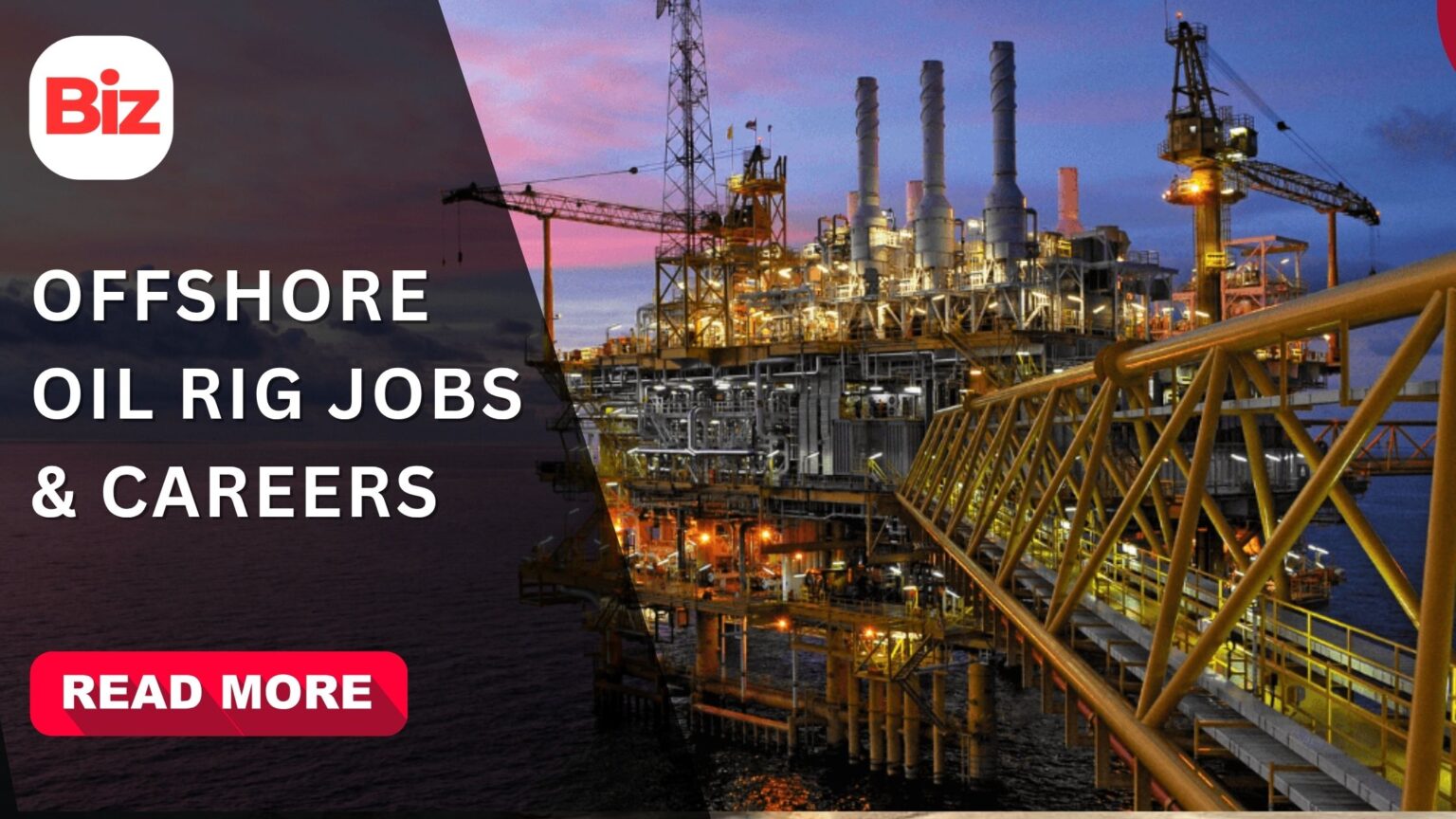- What are Offshore Jobs?
- Offshore Jobs in US.
- Renewable Energy Jobs in the Offshore.
- Hiring in 2025.
- Offshore Jobs where to find them in the US.
- Offshore Oil Rig Jobs Salaries.
- Benefits of Offshore Jobs
- Obstacles of Offshore Careers.
- The way to find an offshore job in the US.
- Outlook of the offshore jobs in the US.
- FAQs About Offshore Jobs
- Conclusion
Among the most important sectors of the US economy is the offshore industry, which supports the energy sector in the country and provides thousands of well-paying jobs. The attraction of professionals to take jobs offshore has been accepted and practiced over decades in favor of working in challenging conditions accompanied by the presence of financial rewards, career advancement, and international prospects. Offshore oil rig jobs are the most desired among these with competitive pay and long term opportunities.
What are Offshore Jobs?
Offshore jobs are those that are on the sea, and are not on the mainland. Most of the people relate them with oil rigs in gulf of Mexico but the offshore careers go to shipping, marine engineering, subsea technology, and even renewable energy like offshore wind farms.
Such employment is designed in a different way to conventional jobs: employees typically serve in rotational shifts such as 14 days on, 14 days off or 28 days on, 28 days off. The system enables professionals to regulate the workload in the offshore between high and low intensity and long rest.
Offshore Jobs in US.
There are a wide range of offshore careers, which include entry-level positions to highly technical jobs. Part of the most common categories are:
Offshore Oil Rig Jobs
Offshore energy production is based on oil rigs. Job opportunities include:
- Roustabout and Roughneck: Low-level workers that clean and maintain the rigs and help drillers.
- Derrickhand: Working on the derrick, drilling rig, and equipment.
- Driller: Oversees the drill crew and manages drilling.
- Toolpusher: Top rig supervisor of safety and efficiency.
- Engineers & Geologists: Experts in the design of drilling and oil reservoir analysis and strategy of production.
- HSE Officers (Health, Safety, and Environment): Making sure that there is adherence to high standards of compliance.
Marine and Support Roles
- Offshore vessel crew (supply ships, cargo handlers, deckhands.
- Underwater technicians working on underwater robots (ROVs).
- Welders and crane operators that assist in the construction and maintenance.
Renewable Energy Jobs in the Offshore.
The emerging offshore wind industry is creating new employment opportunities:
- Technicians who install wind turbines.
- Electrical engineers who take care of offshore grids.
- Surveyors and support vessel operators at sea.
Hiring in 2025.
The United States has a number of large firms that control the offshore employment market. The following are the largest employers that the job seekers should be familiar with:
Oil & Gas Giants
- ExxonMobil: It has the largest offshore oil wells in the Gulf of Mexico. Some of these careers are rig operators, engineers and marine specialists.
- Chevron: Chevron has a record of deepwater operations, which provide offshore oil rig employment with a good career development.
- ConocoPhillips: Specialises in offshore oil exploration and development ventures, it hires engineers, drillers and geoscientists.
- Occidental Petroleum (Oxy): This is a company that deals with offshore oil and natural gas production, as well as recruiting technical and support employees.
- Hess Corporation: Is a company that deals with oil exploration and development in the offshore field.
Contractors of Offshore Drilling.
- Transocean Ltd.: The largest offshore drilling contractor in the world with thousands of employees in rigs around the world.
- Noble Corporation: An offshore drilling service provider that is one of the major employers in the US.
- Diamond Offshore Drilling: It is the pioneer of new offshore rigs.
- Valaris Plc: It has one of the biggest offshore rigs fleets.
Engineering: Oilfield Services.
- Halliburton: Offers offshore energy services, including drilling to underwater technology.
- Schlumberger (SLB): The largest oilfield services company in the world, with good offshore activity in the US.
- Baker Hughes: Provides offshore energy, evaluation and drilling.
- TechnipFMC: It specializes in subsea engineering and offshore project management.
- McDermott International: Supposedly offers offshore construction and marine engineering services.
Offshore Jobs where to find them in the US.
The Gulf of Mexico accounts to about 15 percent of the crude oil produced in US and hosts most of offshore oil rigs jobs in the US. States, which are the greatest beneficiaries of offshore employment, include:
- Texas: Houston is the center of the offshore-oil and gas headquarters.
- Louisiana: Thousands of offshore laborers work out of New Orleans, Houma and Lafayette ports.
- Mississippi and Alabama: Larger though minor players in offshore marine activities.
Offshore Oil Rig Jobs Salaries.
Pay is one of the largest draws of offshore jobs. Although the salaries depend on position and experience, the majority of the offshore jobs have higher wages than the national average.
- Roustabout: $40,000 – $55,000 per year
- Roughneck: $50,000 – $65,000 per year
- Derrickhand: $60,000 – $75,000 per year
- Driller: $75,000 – $100,000 per year
- Toolpusher (Supervisor): $110,000 -150,000/per year.
- Offshore Engineers/ Experts: 100,000 -180,000 annually.
Such salaries usually contain bonuses, hazard pay, free food and lodging during offshore rotations.
Benefits of Offshore Jobs
- Good Pay: Offshore oil rig work is paid year after year at wages far in excess of average US wages.
- Rotational Work Life Balance: Long breaks between shifts.
- Career Growth: The entry-level workers have the opportunity of escalating to senior positions through training.
- International Opportunities: There are numerous US offshore businesses that take place on the international level.
- Skills: Practical engineering, safety, and operations.
Obstacles of Offshore Careers.
- Deplorable Environment: Working under long hours and physically involving.
- Isolation: Employees work weeks without family.
- Safety Risks: Offshore work is still a high risk although there are stringent regulations.
- Irregular Shifts: Shifts can be prolonged by weather or mechanical delays.
The way to find an offshore job in the US.
- Begin with Training & Certifications: It includes courses such as HUET ( Helicopter Underwater Escape Training) and TWIC cards ( Transportation Worker Identification Credential ).
- Entry-Level positions: You can apply as a roustabout, welder or deckhand to get the experience.
- Apply to Large Companies: Visit the career websites of ExxonMobil, Transocean, or Schlumberger.
- Engage Offshore Recruitment Agencies: Best to use specialist recruiters which will match candidates with vacancies.
- Keep Current: Offshore jobs change with the oil prices and demand of the projects.
Outlook of the offshore jobs in the US.
The offshore industry is being transformed:
- Automation: Robotics and AI are also being utilized to enhance the safety of drilling.
- Renewable Energy: States such as Massachusetts and New York are developing offshore wind farms that are creating new employment opportunities to thousands of people.
- Sustainability: Oil companies are becoming diversified, having a chance in fossil fuels and renewable energy.
FAQs About Offshore Jobs
1.Does that mean that offshore oil rig work is an exclusively male profession?
No. Increasingly more women are joining the offshore work force as engineers, technicians, and supervisors.
2. How safe are offshore jobs?
Safety procedures are very stringent yet the work remains risky due to the conditions and the machine.
3. Do offshore employees pay any taxes?
Yes, the offshore workers who are employed by US companies also pay federal and state taxes.
4. Is it possible to work offshore with no experience?
Yes. No offshore experience is required because anyone meeting training requirements can take entry level positions such as roustabout.
Conclusion
Offshore employment is one of the pillars of US energy employment. Offshore oil rig employment presents a good salary, career growth, and an international work experience to people who will be happy to work under the harsh conditions. The work is stressful and can be very dangerous, but it still manages to lure thousands of workers annually.
As the Gulf of Mexico continues to be the hub of oil and gas and with new opportunities arising with offshore wind, the offshore industry will continue to be a source of the American jobs in decades to come.
ALSO READ OGDCL Pakistan Finds New Oil Reserves in Sindh Region








